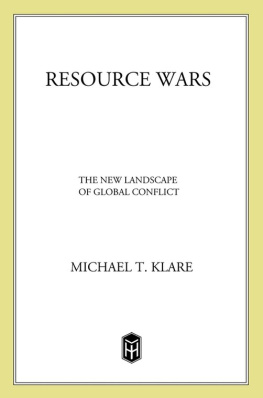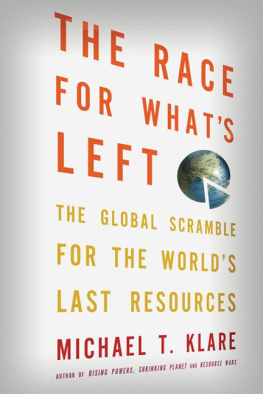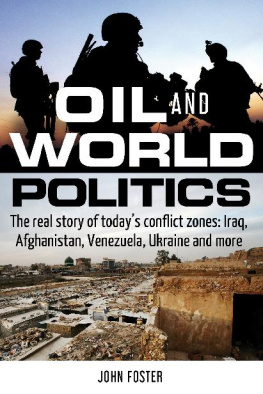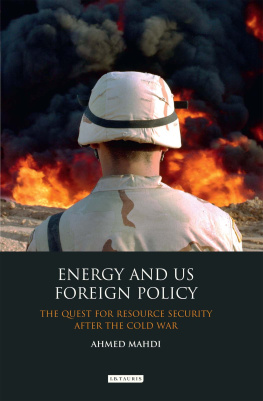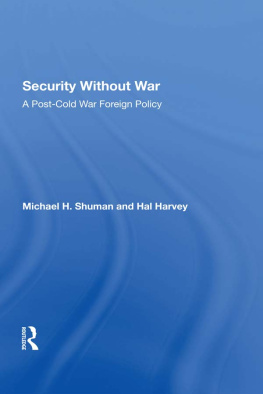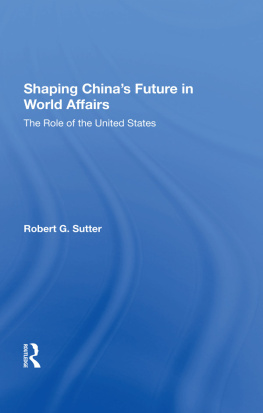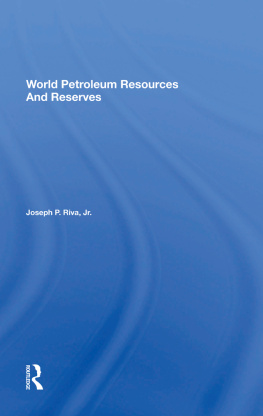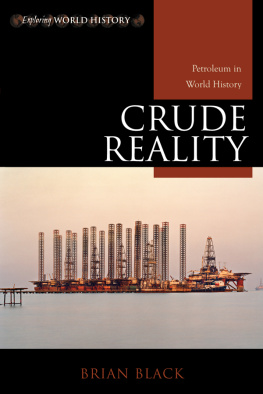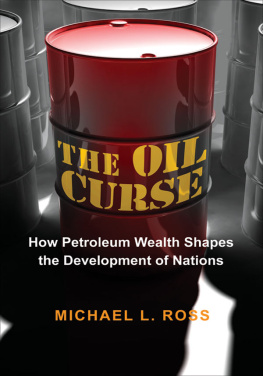PENGUIN BOOKS
BLOOD AND OIL
Michael Klare is the author of Rogue States and Nuclear Outlaws, Low Intensity Warfare and Resource Wars. He is the Five College Professor of Peace and World Security Studies at Hampshire College in Amherst, and lives in Northampton, Massachusetts.
BLOOD AND OIL
The Dangers and Consequences of Americas Growing Petroleum Dependency
MICHAEL T. KLARE

PENGUIN BOOKS
PENGUIN BOOKS
Published by the Penguin Group
Penguin Books Ltd, 80 Strand, London WC2R 0RL, England
Penguin Group (USA) Inc., 375 Hudson Street, New York, New York 10014, USA
Penguin Group (Canada), 10 Alcorn Avenue, Toronto, Ontario, Canada M4V 3B2 (a division of Pearson Penguin Canada Inc.)
Penguin Ireland, 25 St Stephens Green, Dublin 2, Ireland (a division of Penguin Books Ltd)
Penguin Group (Australia), 250 Camberwell Road, Camberwell, Victoria 3124, Australia (a division of Pearson Australia Group Pty Ltd)
Penguin Books India Pvt Ltd, 11 Community Centre, Panchshed Park, New Delhi 110 017, India
Penguin Group (NZ), cnr Airborne and Rosedale Roads, Albany, Auckland 1310, New Zealand (a division of Pearson New Zealand Ltd)
Penguin Books (South Africa) (Pty) Ltd, 24 Sturdee Avenue, Rosebank 2196, South Africa
Penguin Books Ltd, Registered Offices: 80 Strand, London WC2R 0RL, England
www.penguin.com
First published in the United States of America by Henry Holt and Company, LLC 2004
First published in Great Britain by Hamish Hamilton 2004
Published in Penguin Books 2005
Copyright Michael T. Hare, 2004
All rights reserved
The moral right of the author has been asserted
Except in the United States of America, this book is sold subject to the condition that it shall not, by way of trade or otherwise, be lent, re-sold, hired out, or otherwise circulated 1 without the publishers prior consent in any form of binding or cover other than that in which it is published and without a similar condition including this condition being imposed on the subsequent purchaser
ISBN: 978-0-14-192718-3
For my brother and sister, Karl Ernest Klare and Jane Elizabeth Klare, with eternal gratitude for their steadfast loyalty and support
CONTENTS
PREFACE
There was a time, not so very long ago, when we thought that the end of the cold war would bring forth a world of greater peace and stability. Because so much of the strife of the cold-war erain Korea, Vietnam, Afghanistan, and Central America, for examplewas tied to the hostility between the United States and the Soviet Union, it was natural to assume that global violence would abate once the two superpowers ended their enmity. President George H. W. Bush even envisioned a new world order,in which international disputes would be resolved through diplomacy and multilateral peacekeeping. But, of course, the new world order never materialized. We have seen as much armed conflict in the post-cold-war era as we saw earlier, and in some respectsnotably the rise of terrorismthe world has become even more dangerous. Trying to explain this upsurge of violence in an era of diminished rivalry between the great powers is the most difficult task facing conflict analysts today.
To many observers, the explanation lies in identity politicsthe re-assertion of ethnic, religious, clan, and tribal ties in the wake of vanished ideologies and global disequilibrium. The best-known expression of this assessment was Harvard professor Samuel P. Huntingdons influential 1993 Foreign Affairs article, A Clash of Civilizations? Dividing the world into broad civilizational groupingsWestern/Christian, Slavic/Orthodox, Muslim, Hindu, and ConfucianHuntingdon argued that hostility between these groups amounted to the latest phase in the evolution of conflict in the modern world. And, indeed, some of the most deadly encounters of the post-cold-war period, in such places as Bosnia, Kashmir, and Chechnya, appear to bear out his theory. But many other wars and alliances of the past fifteen years do notwitness, for example, Americas partnership with such uncompromisingly Muslim states as Saudi Arabia and the United Arab Emirates in the 1991 war against Iraq. Clearly, we need to look for another explanation.
After examining a number of recent wars in Africa and Asia, I came to a conclusion radically different from Huntingtons: that resources, not differences in civilizations or identities, are at the root of most contemporary conflict. In Angola and Sierra Leone, it was control of the diamond fields that sustained the bloodshed for so long; in the Congo, gold and copper; in Borneo and Cambodia, timber. Ethnic and religious antagonisms certainly played a role in these clashes, but usually as a mobilizing ploy by the chieftains, warlords, and demagogues who were out to dominate those promising sources of wealth. Time and again, my search for the cause of a protracted war turned up a struggle over scarce or valuable materials: diamonds, gold, copper, old-growth timber, arable land, fisheries, waterand, in several notable cases, oil.
When I presented these findings in my 2001 book Resource Wars: The New Landscape of Global Conflict, I viewed all resources roughly the same way: as vital materials whose growing scarcity in the twenty-first century would trigger an endless series of hostilities unless we did a better job of allocating the worlds precious bounty. As I saw it, oil, water, land, and minerals were each important enough to provoke a conflict when quantities were limited or when two or more groups laid claim to the same source of supply. Oil would be a significant cause of conflict, but no more so than any other resource.
Since then, a series of events has forced me to reevaluate that conclusion. Resource Wars was published on May 17, 2001the same day that President George W. Bushs administration released its National Energy Policy, prompting angry debate over the implications of our growing dependence on imported oil and the merits of drilling in Alaskas Arctic National Wildlife Refuge (ANWR). Four months later, Al Qaeda operatives struck the World Trade Center in New York and the Pentagon in Washington, D.C. Suddenly terrorism became the nations number-one security concern, triggering a new phase of U.S. military involvement in the Middle East. That fifteen of the nineteen hijackers were Saudis and that Saudi charities were linked to Al Qaeda brought new attention to Americas ties with Saudi Arabia, our leading foreign oil supplier. Then, before long, President Bush and his lieutenants began talking about war with Iraq, once again raising the issue of oil as a factor in American foreign policy. All these developments compelled me to conclude that petroleum is unique among the worlds resourcesthat it has more potential than any of the others to provoke major crises and conflicts in the years ahead.
Why should this be so? The answer was not immediately obvious. Of course, petroleum had been an important source of conflict throughout the twentieth centurybut so, too, had water, land, and minerals. Now, in the twenty-first century, oil seemed to have outpaced all the others in its potential for sparking armed violence. To explain why this particular resource had acquired such a pivotal and volatile role, it seemed necessary to probe its significance more deeply. And so I undertook an intensive study of oil, geopolitics, and American foreign policy.
To some extent, this effort meant revisiting territory I had traveled before, notably the evolution of our countrys ties with the oil producers of the Persian Gulf. Nevertheless, this old territory yielded some surprising revelations. For example, while President Franklin D. Roosevelts February 1945 meeting with King Abdul Aziz ibn Saud of Saudi Arabia is well documented, there has been little recognition of the significance of that encounter, which produced the unprecedented oil-for-protection arrangement that has governed American ties with Saudi Arabia ever since. Just as striking is the saga of the Petroleum Reserves Corporation, an ill-fated but extraordinary effort by the Roosevelt administration to place Saudi Arabias most prolific oil reservoirs under U.S. government ownership.
Next page

